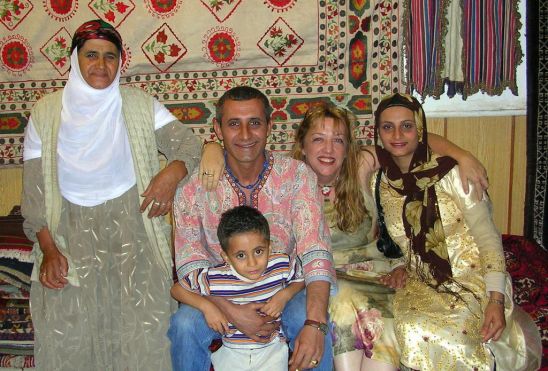In Defense of Turkish Men: A Love Story

A Chance Encounter in Turkey
The man in the well-cut black suit stood watching me as I struggled to carry my overweight duffel bag across the cobbles of the narrow shopping street. “Must be another carpet seller,” I sighed to myself; no way around him without reversing course. After three weeks of solo travel enjoying Western Turkey – that day a hot 3-hour bus ride from Pamukkale to the small Aegean town of Selcuk – I was tired and talked out.
A single foreign female of any age will invite attention from men, women and children. Depending on where I was, this attention was mostly benign, but exhausting. The Turkish people I’d met plus those I’d worked with on several previous business trips were genuinely hospitable, but too curious for my big-city American sensibilities. I just wanted to see the sites anonymously and then move on. But in Turkey, there is no such thing as being unobserved.
When Turks meet each other, the first question asked is “Where is your hometown?” This bit of knowledge imparts valuable social information, much like in the US, when we ask, “What do you do for a living?” Though Turks haven’t been nomads for centuries, it’s common to have lived in several parts of the country. Turks in tourism ask visitors “Where are you from?” for the same reason. I wrongly presumed they were trying to call me out as foreign, when it was already likely I was.
In Turkey, there is no such thing as being unobserved.
“Can I help you find a hotel?” the man in black said politely in perfect English, not asking where I came from.
“Know where I’m going – no thanks,” I replied, jerking my bag away from his outstretched arm as I mumbled the hotel name, to prove I wasn’t bluffing.
“But that’s in the other direction,” he responded with a slight smile. “And it’s not a very nice place.” Good ploy to get me to stay at his cousin’s hotel or have a look in his carpet shop, I thought. I knew by now to avoid these touts, since I’d been warned they were only after my credit card, my body, perhaps even a Green Card. That’s what every foreign women visiting Turkey is told to expect, aren’t we?
I’m experienced enough to know that life is not well lived by being tentative or fearful. I’ve developed a good instinct for self-preservation, having traveled solo to about 40 countries. Dress modestly, be aware of your surroundings, walk with purpose, don’t smile at everyone, seek local women if you need help. If I’d listened to the warnings that Turkey is dangerous and ignored my finely-tuned intuition, my life would not have taken the amazing turn it did.
A Turkish Love Story
For though I managed to elude the carpet seller that day, a casual conversation with him the next led to a stroll through the ruins of a 6th C basilica, dinner under a nomad tent during a thunderstorm, time spent together in Istanbul, and several more trips back to Turkey. He turned out to be genuinely good guy who had lived in three countries, including a decade in Istanbul. Eventually I relocated to Selcuk in 1999; we pooled our resources to open a vintage textile shop, and later a waterpipe cafe. A chance encounter on the street led to the life I was meant to be living. I’d fallen in love with the whole culture as much as with this man.
My friends and I are frequently asked by casual acquaintances how we deal with our husbands’ presumed infidelities, as if it’s a given that all Turkish men cheat.
A fairytale that rarely happens? Of the dozens of marriages between foreign women and Turkish men I’ve known, about half turn out well, much like other places in the world. But being married to a Turk has a stigma I wonder if other nationalities experience: my friends and I are frequently asked by casual acquaintances how we deal with our husbands’ presumed infidelities, as if it’s a given that all Turkish men cheat.
Why Turkish Men Have a Bad Reputation
While it’s true there are a significant number of Turkish men who flock to touristic locations for the sole purpose of playing gigolo or scoring a foreign passport, to cast aspersions on the entire male population is wrong. For a moment, consider life from the perspective of these men. I don’t agree with their thinking, but it may help to explain it. They could stay in their small towns to learn a trade; they could study to be accepted to university. Or they could work in tourism in the hope of meeting women from around the world, like the ones they’ve seen in countless Hollywood movies. After all, they think, it’s well known that Western women have loose standards and are looking for a holiday romance…why not with them? It’s far more enticing than staying in the village to deal with family customs around meeting Turkish girls.
Big-city Turks are different than the boys along the beaches. Sultanahmet salesmen have to be clever and quick, like sharks, always moving forward. Many of them are formally educated and speak 8 to 10 languages fluently. Yes, there are still the guys who call out “Hey, lady” in the street, clueless that a Western woman will be repelled. Completely ignore them as any Turkish woman would; they’ll move on to a traveler who reacts. We visitors are their daily sideshow, entertainment to pass the time and perhaps part with some cash. These men live with constant rejection, so no guilt for breezing right on by. Learn to say “ayip” (Aye-YIP) loudly just in case. But anyone interested in human nature could earn a street degree in anthropology by watching life within carpet shops.
But few Turkish women work in tourism because it can be annoying to deal with the men – Turkish or foreign.
In Selcuk, I was frequently asked “Where are all the women?” More than half the doctors, lawyers and accountants in this country are women. They work at every job, keeping busy as women must, with little time to wile away in teahouses. But few Turkish women work in tourism because it can be annoying to deal with the men – Turkish or foreign.
Showing People the Real Turkey
After a decade in tourism myself, I see their point. We’ve recently moved from Selcuk to Istanbul’s Old City to open a handcrafts workshop, a gathering place to support local unsung artisans: the women who grew up weaving, knitting, crocheting and making functional things of beauty for their families. Istanbul is a magical, challenging city with a diverse population of women. Some of these women are reviving timeless Turkish traditions as a hobby or a career. There are other women with fewer opportunities here from rural Turkey who’d like to earn money within a safe community of women. A village within a megacity, our workshop will give traveling women a chance to get to know Turkish women through classes we’ll offer. Hands engaged to learn new skills and teach traditional ones, spinning yarns, clacking needles and drinking tea together, we’ll share the common language of craft with stories from our lives and about our cultures.
Finding my place in another culture and a voice in my husband’s huge tribe was not for the faint of heart; it’s a journey that continues.
Traveling though a country is quite different than living there: it’s not the sites you must see, but the people you must connect with. Was I just lucky, to have happily married a Turkish carpet seller, a man as enchanted with textiles as I am, one who knows better than to hassle women on the street? I’d say we make our luck by action, not apprehension. Finding my place in another culture and a voice in my husband’s huge tribe was not for the faint of heart; it’s a journey that continues. In this ancient, indefinable country in which no one goes unobserved, I’ve learned to take chances. While I won’t defend all of them, sometimes it’s safe to talk to Turkish men.

California native Catherine Salter Bayar designs and writes from her new home in a very old city…visit her blog Tales from Turkey (www.bazaarbayar.blogspot.com) and expat+HAREM (www.expatharem.com), the global niche, where she is a serial guest blogger.
In Defense of Turkish Men: A Love Story









Hello Catherine,
I read your article with great enthusiasm. Most of the things I have read and (heard) about Turkish men were mostly bad. However, thanks to you my perception has changed. I plan to travel to Turkey next year in the summer to visit a friend…..am African from East Africa. Any tips about what to expect? Thanks so much and hope to hear from you.
Thanks, Emmaculate! Like anywhere you travel, solo or with a friend, use your street smarts and common sense, don’t wear skimpy beach clothing in the city or town center, walk with purpose. But know that, in general, Turks like to stare – the more foreign you look, the more likely they will. Just ignore it or any comments you may get, knowing you’re temporary entertainment and they’re most likely not threatening, just annoying. It will be easier since you know someone living here. Enjoy your trip!
Thanks Catherine,appreciate the information very much,especially about the dress code. You have been very helpfull.
Thanks Rachel – well, it was my second try! ;-D You are so right – it’s all about their hearts and ethics. I love that village idiot quote and will have to use it, if you don’t mind. It’s interesting how some cultures deal with situations like you describe in Brazil – to have everyone know it goes on. Here in Turkey, they used to do that legally a very long time ago, but the wives had to have exactly the same houses, money, etc. so few men could pull that off. How the Sultans dealt with all the women in the Harem – and vice versa – is beyond me! I’m looking forward to getting the book completed as well (not this year). Meanwhile, the stories just keep piling up….XO
Nice article, Catherine! Can’t wait until your book comes out! You are such a wonderful story teller! I’ve really come to believe in the village analogy. When friends start going on and on about people from this country or that are better or worse because of this or that, I harp in with the “Every village has its idiot, its priest, its hooker, its saint and its gossip.” There are cultural things that definitely define any community and unemployment anywhere will lead to congregations of men looking for action. Growing up in Brazil, my father said, “Never marry a Brazilian. They are saints before marriage and devils afterward.” It was common among the elite of our city for men to have their wives and legal children and then support at least one mistress and the bastard children in separate houses. I also had a cross cultural marriage with a Moroccan and assumed that many of the problems we had in our marriage were cultural. But, when he got his citizenship and dumped me, I realized that the problems were based on his ability to lie. The statistics I’ve read about love marriages and arranged marriages are a 50-50 percent chance of happiness. You were fortunate to find a good man and I wasn’t. It doesn’t matter where they come from, it has to do with their hearts and their ethical code.
Thank you Judith! I think as women travelers, we are all ‘suspect’ of a place and people we do not know. Before we arrive, we can only rely on what others say, on travel sites such as Pink Pangea, or what the guide books say. I hope that women will never drop their defenses when they travel, but will trust their instincts to see beyond stereotypes, as you say. XO!
Dear Catherine, As far as I’m concerned Turkish men don’t need defense. To me your essay speaks of trust in yourself. Trust in your intuition, trust in knowing what’s real and what’s not, trust in knowing what it is you want in and of a partner. If anything your essay is in defense of all the above and of willingness to see beyond skin deep, beyond the outward, beyond the stereotype. Ah, writing this last word, I see why you chose that title. Well done my sister. Still, looking at the photograph of you and your Turkish family, there’s nothing that needs any defense at all. Love, Judith